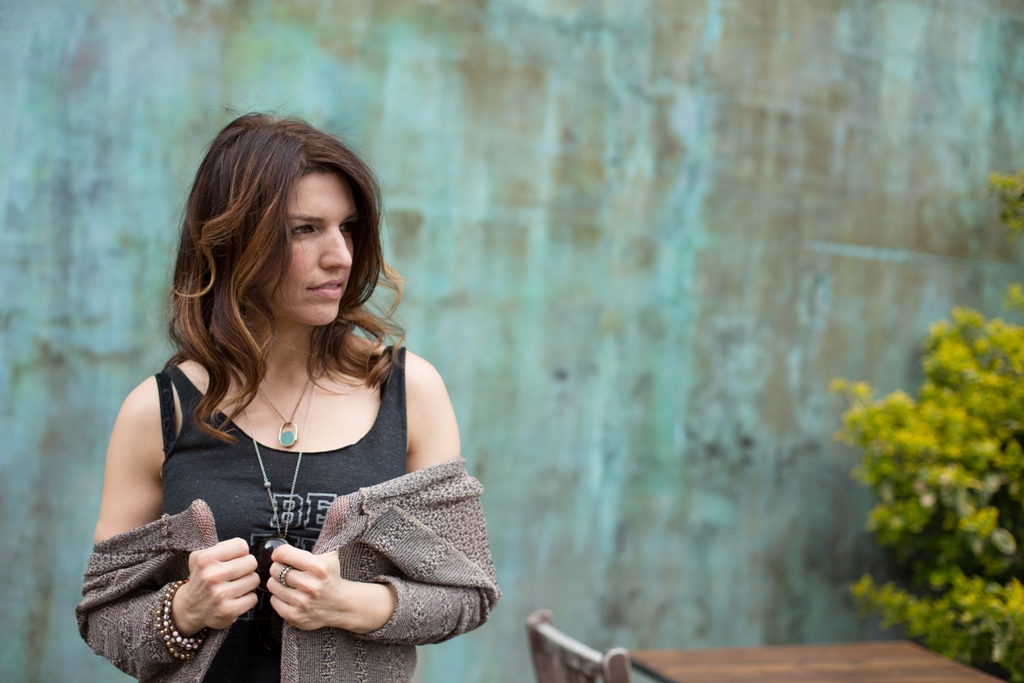
Photos by Sabrina Lantos
Bree Sharp first came to wide public attention in 1999 with the first single from her debut album (A Cheap and Evil Girl), a song about X-Files actor David Duchovny, and, as she put it at the time, about “the way fantasy and reality can blur, and how giddy, hot, and excellent that can be”. Since that initiation Sharp has been exploring the range of her talents and passions: acting, teaching, animal rights advocacy, and, of course, music. Her current band, Beautiful Small Machines — which she co-founded with producer/singer Don DiLego — released its third album, The DJ Stayed Home (Velvet Elk Records) this past summer.
This is an edited transcript of a three-part phone interview.
SCOPE: I’d like to start with a question about your neighbourhood, because I’ve been struck in the last year or two by the number of new bands coming out of Brooklyn. Do you feel that you’re part of that scene?
BREE SHARP: You know, I could say that I was, but I’m totally not. I never have been part of the scene. Because I grew up wanting to be an actor, and I went to school for that, I really sort of fell ass-backwards into a music career. Everything happened so quickly: getting a record deal, and having air play, and getting interviews in national magazines. I was so young, and it wasn’t what I had planned — but by the time I caught up with it and really got into it, my label had gone bankrupt. I was like ‘hey, I’m just starting to get used to this, and understand what I’m doing!’
So I really never was part of a music scene. Now, my writing partner and producer for the last fifteen years, Don DiLego, plays every instrument, and he’s been in bands since he was eleven years old. I would say he’s a musician and I’m the performer, and that’s why there’s a really good pairing.
Do you come from an acting family, or are they more musical?
No, I mean, as a matter of fact, we laugh about it all the time. First of all, my father is tone deaf and has no rhythm — and so my sister and I are always cracking up. But God bless him he’s at every show, singing every song. It’s really, really sweet, and he and my mother have been extremely supportive from the very beginning, ever since I was little. They never tried to steer me to another career, never said, you know, “Don’t be an actor, don’t be a musician.”
My mother and my maternal grandfather both sang a lot. They didn’t sing professionally, but my mom sang to me when I was a little girl all the time. She’s always singing, there’s always music on. And my grandfather was sort of a performer in the Jewish community. We have pictures of him in drag, and in these crazy costumes, and he would just get up, I think, for the old Jews at some kind of community function, and like, do shtick. I guess I get it from that side.
When you were a teenager you wanted to be an actor, but were you learning guitar and piano on the side?
I don’t play piano. I took up the guitar when I was eight, and then I quit, and then again when I was eleven, and then I quit, and then when I was fifteen — I really learned how the summer I went vegetarian. There was a bunch of hippie dudes playing Grateful Dead, Simon & Garfunkel, and REM — that was in 1991. And then I started writing songs after my first heartbreak when I was seventeen and in college. You know how that goes: boy breaks girl’s heart, girl writes song.
[pullquote]I hated Bob Dylan when I first heard him, because his voice just takes forever to get used to. But then all of the cracks and whines in his voice became beautiful.[/pullquote]
I think that’s a section of the library too. So who were you listening to — I mean you mentioned REM and so on — but when you started writing, who were you trying to write like?
Well, I guess Bob Dylan — I’m a huge Dylan fan. The guy I was dating was older, and loved Bob Dylan, and really turned me on to him. He was out of college and a philosophy major, and he was the one that [taught me to] really listen to the lyrics, and to poetry. Of course, like most people, I hated Bob Dylan when I first heard him, because his voice just takes forever to get used to. But then all of the cracks and whines in his voice became beautiful. They were really unique to him, and emotional and expressive, and I ended up really loving that about him.
And then when I got into college, I was so into Elvis Costello, and I don’t think I write at all like him. But I have a theory that there are two kinds of music listeners: people who hear lyrics — which is me — and people who hear music, which is Don. He appreciates Elvis Costello, but he doesn’t love him, and I think the reason he doesn’t love him is because he doesn’t hear the lyrics first. And because I do hear the lyrics first, I always like hearing the story. When Wilco came out, he was in love with Wilco. They’re obviously really interesting musicians, but a lot of their lyrics are not linear, and I used to get turned off, because what is he talking about? What’s his story? And I think, over the years, we’ve met more in the middle. I’ve experimented with getting less literal with my lyrics, more abstract.
But I also, as a young girl, loved Tori Amos. I really love Patti Smith, as well as Patty Griffin — oh, she’s great. I listen to her all the time.
You seem to write music as an excuse to write poetry.
[Laughs] I don’t know if that’s true, because I don’t write the lyrics first. I love music and I love to sing… but I don’t like to sing just anything. I like it when it’s clever and heartfelt but not earnest — I can’t stand earnestness — but, you know, meaningful. I always like it when there’s another layer, so I guess that’s what I’m interested in. But I want the music to be good, and I think when I first started writing — I think a lot of writers do this — you write a lot. So you have, like, eight verses to a song, and that was okay in the 70s, but it’s not really palatable to people now.
There was a little bit of a learning curve about how not to be precious about your work, and to do whatever would serve the song. That’s a really, really good tool, to be able to be a good editor. This from a woman who’s half an hour over her interview already because she can’t stop talking!
In the shift from, let’s say, Bree Sharp version 1.0 to Beautiful Small Machines, what’s been driving the change in your sound? Did you feel that you’d fully explored your previous version?
Well, I don’t think that I felt that way consciously. It wasn’t like, I feel bored and I am boring people, or that I’ve done everything I could — but I think that must have been a thought, subconsciously. Because Donnie [DiLego] had the idea for the song that became “Robots in Love”, and I heard it and was like, yeah. It was more that I was turned on by whatever we were doing in the studio and I didn’t want to stop, and I didn’t want to try to corral it into, you know, a singer-songwriter vibe, or even a pop rock vibe — which is, I think, where I had been. I just was like, I love these sounds and I want to do more of them. And I think in part because I didn’t grow up being a musician, and didn’t have dreams of being a musical artist, I’m a little freer in that way because I’m not tied to a vision of myself. So if I like something I can just say, I like this and I want to do this and I think this is a new and interesting way to tell a story.
We’re all telling the same story. Really, the same story’s being told over and over, you know: it’s heartbreak, it’s loss, it’s joy, it’s sex. I mean there’s not a ton of themes out there. You know what I mean? It’s just a different way to tell it.
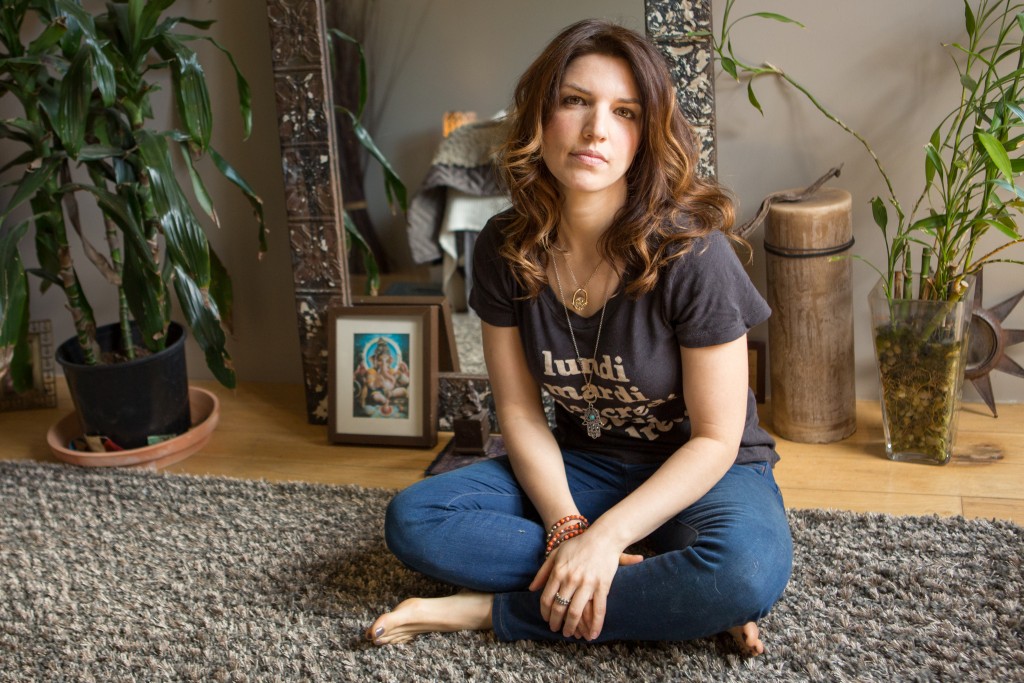
So where does your career go now? You started out wanting to be an actor and ended up a successful musician — and at the same time you’re also acting, having been in the indie films Bert and Arnie’s Guide to Friendship and the upcoming Staring at the Sun, and you’re doing theatre, and so on. What roles do all these activities play in your life?
Well, one thing I’ll say is it’s been really busy, and sometimes I get confused — like, where am I supposed to be? I’ve been singing for commercials for the last four or five years, and then I [recently] started a voice-over career. I also run a business: I teach group music classes to infants and toddlers in Soho. I teach about an hour a day, so I have my days free, but I get to be with the kids in the morning, which I love. When I first started doing it, I think it seemed like an ego check to me, because I had been on the radio and had toured everywhere and been in all these magazines, and then suddenly I was teaching kids, and I felt a little like I had failed in some way.
It’s a scary moment.
Yeah! Exactly, exactly — because that was not the plan. However, I’m so grateful for it. I genuinely love it. They’re babies. And it’s just really, really wonderful. If I’m going through a tough time emotionally, for whatever reason, whatever ups and downs in life… and I go into the room and they call me Breezy, and they want to sit on Breezy’s lap, they want to touch Breezy’s guitar, they want to give Breezy a hug… It makes everything go away, even just for the hour. It’s been a real light in my life, for sure.
I teach in the morning, and then I have auditions. I’m either auditioning for a voice-over, or I’m auditioning for a commercial, or I’m auditioning for an acting role. Or I have a booking and some recording. And then I really try to keep up my yoga classes and go at least twice a week. And then I’ve got the band, and I’ve got time in studio and shows and rehearsals.
I spent a year and a half on a sketch comedy team, too: the Upright Citizens Brigade. When I got on the team there, I cried. I’ve wanted to be an actor my whole life, and I love comedy. But I never really got a chance to do it, and it’s a really coveted spot. Hundreds of people apply, and they only see one hundred, and they only cast eight. I called my dad crying, and he said, “Tell me what’s the matter!”, and I was like, “No, no, it’s a good thing! I got on the team!”.
So I’m all over the place. I think it’s important not to be aimless and to have clear goals. And I think right now I’m really interested in building up my acting résumé. I’d really like to do some more television [Bree appeared in a recent episode of Louis C.K.’s show, “Louie”, on FX Networks], and some more film work. And I would like to make another Bree Sharp record. That’s the five-year plan.
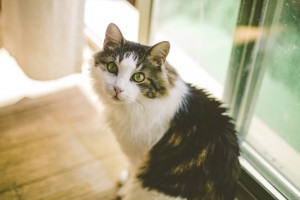
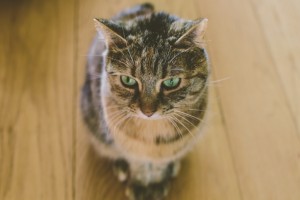
You mentioned in an interview about ten years ago that you had two awesome cats. Do you still have them or have they passed on?
They have passed on, and I have two other awesome cats right now, Raisin and Sebastian. But the kitties that I had then, I think about them all the time, and the kitties that I have now, I talk about all the time. Every night when I go to sleep, they’re next to me and every morning when I wake up they’re next to me. I just think they’re wonderful companions. They’re pretty amazing.
Sometimes I’ll just look at another creature, whatever it is, any animal: a cat, a dog, a snake, an ant, a giraffe. I mean, they’re amazing and they can do crazy things. I think animals are fascinating. They have their own language, and they move in their own ways, and they have crazy skin and fur and they have special powers. It seems like they can hear a hundred times better than we can, you know? It’s X-Men stuff!
There’s both a closeness and a distance, isn’t there?
Did you see Grizzly Man? You know, Werner Herzog is the exact opposite of me. At the end of movie he said something like, I forget the guy’s name but…
Timothy Treadwell.
Right. So he was like, “Timothy looked at the bear and saw majesty and magic” — I’m paraphrasing — and then he said, “I look at him and see a hungry bear.” I think the truth is somewhere in between people who really anthropomorphize animals like I do — I’m totally empathic to them, and I think they’re magical — and then the other end of the spectrum, where they’re completely blank, devoid of emotion, and just instinctual bits of evolution that are not near us.
I think the truth is a blend, and that’s where I think respect comes in. You have to say, I think they’re wonderful, but I also know that I’m assigning certain things to them, and I have to respect that I really don’t know. When whales and dolphins are communicating with each other, we don’t know what the hell they’re saying. It’s amazing. It’s a code that they’re still trying to crack. So we don’t really know.
[pullquote]At some point, I was old enough to make the connection — because society does a really good job of making sure that you don’t make the connection — that the animals I loved so much, walking around and alive, were the same animals I was eating.[/pullquote]
You became a vegan as a teenager, is that right? Did that develop from your reading or from an experience you had?
From what I can recall about being a child I always just loved animals. And I think at some point, I was old enough to make the connection — because society does a really good job of making sure that you don’t make the connection — that the animals I loved so much, walking around and alive, were the same animals I was eating.
So I grew up eating animals and I had all my birthday parties at McDonald’s, but then when I was fifteen years old I went away to summer camp. I was part of a Jewish youth group,and it was by far the best summer of my life, to this day. I met the most amazing people, did the most amazing things, ate good meals, and every day laughed and sang and danced and read. And it was just wonderful.
Anyway on Shabbat, on Saturdays, you had electives, and you got to pick what you wanted to do. There was a counsellor there who was a vegetarian, and he was giving a talk, and I had always been curious and so I went. One of my good friends from that summer was also vegetarian, and they had a vegetarian meal plan. So I was out of my element, I was away from the McDonald’s, I had new knowledge, I had a new friend, and I had food that was being offered to me that was vegetarian. So I stopped eating meat and poultry that summer.
Then about six months later, I went on a program called The March of the Living, which was a week in Poland and a week in Israel. We went through the camps from the Holocaust. Needless to say, it was a horrifyingly depressing trip, especially for a 16-year-old — and I was a depressive kid. It shaped me for sure, but it was intense. Without going into the graphic details of what we saw when we were in Poland, the last image that we saw was two hundred tons of human ash under this dome, leaving me thinking about the darkest, darkest evil man can be.
So we left Poland and we got to Israel. And, you know, I’m not practicing anymore, I’m not really religious. But definitely after learning about how my ancestors had been persecuted, [I realized] “Wow, we have a safe place.” And the country is so beautiful, but they were still taking us to Holocaust museums. It was exhausting. I think our bus driver felt bad for us, because he took us on an unscheduled trip to the beach. We had an hour to kill, and he just drove up and said, “Guys, get out and go frolic.” And everyone was running around, running in the water and stuff, and I started collecting shells. They are really different from what we see on the Jersey shore, and I came across a clam shell, and it was closed.
Somewhere in the back of my mind I knew that meant it wasn’t dead, but it couldn’t come to the front of my mind — I wasn’t a big seafood eater. Anyway, I put it in my bag with all the other stuff, and we went along with our day. We got back to the hotel, and I was cleaning everything out from my bag, and this clam started opening and closing, slowly opening and closing, and I was like “Oh my god, it’s suffocating or something.” I didn’t know what — but I knew that it was dying, and I knew that it was my fault. And it died, and we said Kaddish for it, which is the Jewish prayer for the dead. I vowed then and there that I never wanted anything to die at my hand. And I stopped eating fish. It took me another almost eighteen years until I was completely vegan.
You came to it entirely from an ethical standpoint, rather than health?
I did come to veganism for the animals. But as I have researched it more, and gotten older and become interested in other things, too, it’s also that eating animals and eating animal protein is one of the worst things that you can do for your health. I find that — sadly — more people are really interested in how they can help themselves. But I don’t really care, as long as they eat fewer animals. It’s pretty neat, actually: you can come at it from all these different angles, and you end up reaching the same conclusion.
I think that going vegan is a lot easier than we are afraid it’s going to be. There are so many more vegan options now, it’s just getting easier and easier. And I think once you have all the facts about (a) how the animals are absolutely just tortured and brutalized, (b) what eating meat is doing to your body, how it’s linked to cancer and heart disease, and (c) what it’s doing to the earth, there really isn’t a good reason to continue to eat animals in this country.
If you are in an impoverished country and you don’t have access to clean vegetables, or any vegetables, that’s a different story. But in this country, where most of us have access to vegetables, to meat alternatives, to dairy alternatives, and to grains and whole foods that are healthier for us, the only reason to not be vegetarian is selfishness. I think it’s easier to say, “This is just what I like” when you are looking at it as a food item. But when you really get in touch with the fact that there was a creature that’s got the same capacity to feel fear and pain as your cat or dog, and that its entire life was spent in misery and pain so that you could enjoy ten minutes of eating it, it’s really kind of inexcusable. I hate to say it, because it sounds so judgemental and I don’t mean to be, but that’s just the conclusion that I’ve come to.
I don’t judge people that are still eating animals because I was one of them, and it is a process — but I do urge people to consider it. There’s so much information out there — you can basically Google “What’s it like on a factory farm for a pig?” Pigs are the fourth-smartest animal on the planet. They are smarter than dogs. It basically goes chimpanzees, dolphins, elephants, and pigs. So to think that there’s a creature that’s sentient, that has such cognitive awareness and ability, and that they are being kept in pens where they can’t turn around.
It’s just time for us to evolve into a more compassionate species — it really is. We have the brains, we have the power to do it, we have all the resources… it’s just a matter of taking a little bit of responsibility. When you read about animal suffering and you’re like, “Oh my God, that’s so horrible,” you can say, “Wait a minute, I can actually do something about that three times a day, 365 days a year, every time I eat. I can make a better choice every time I buy clothes. I can make the better choice.”[spacer color=”9B1F11″ icon=”fa-paper-plane” style=”1″]
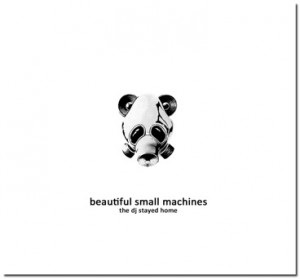 Beautiful Small Machines’ album, The DJ Stayed Home, is available on iTunes, Amazon, and Bandcamp.
Beautiful Small Machines’ album, The DJ Stayed Home, is available on iTunes, Amazon, and Bandcamp.
http://www.beautifulsmallmachines.com
For Bree’s personal work and acting clips, visit: http://www.breesharpreels.com
Sabrina Lantos is a Toronto-born, Brooklyn- and Los Angeles-based photographer.
slantos.4ormat.com
www.sabrinalantos.tumblr.com
www.instagram/sabbles

